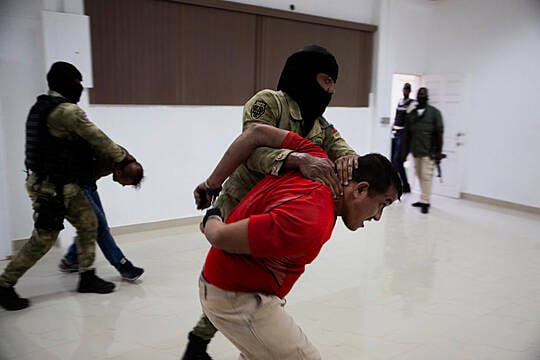Two men believed to be Haitian Americans – one of them purportedly a former bodyguard at the Canadian Embassy – have been arrested in connection with the assassination of Haiti’s president.
James Solages and Joseph Vincent were among 17 suspects detained in the brazen killing of president Jovenel Moise by gunmen at his home before dawn on Wednesday.
Fifteen of them are from Colombia, according to Leon Charles, chief of Haiti’s National Police. He added that three other suspects were killed by police and eight others are on the run.

“We are going to bring them to justice,” he said as the 17 suspects sat handcuffed on the floor during a press conference on Thursday night.
Colombia’s government said it had been asked about six of the suspects in Haiti, including two of those killed, and had determined they were retired members of its army.
The oldest suspect is 55 and the youngest, Solages, is 35, according to a document shared by Mathias Pierre, Haiti’s minister of elections.
Solages described himself as a “certified diplomatic agent”, an advocate for children and budding politician on a website for a charity he established in 2019 in south Florida to assist residents.
On his biography page for the charity, Solages said he previously worked as a bodyguard at the Canadian Embassy in Haiti.
The Canadian Embassy did not immediately comment, and calls to the foundation and Solages’ associates at the charity either did not go through or were not answered.

Witnesses said two suspects were discovered on Thursday hiding in bushes in Port-au-Prince by a crowd, some of whom grabbed the men by their shirts and trousers, pushing them and occasionally slapping them.
Officers put them in the back of a truck and drove away as the crowd ran after them to the nearby police station.
Once there, some in the crowd chanted: “They killed the president! Give them to us. We’re going to burn them!”
One man was overheard saying that it was unacceptable for foreigners to come to Haiti to kill the country’s leader, referring to reports from Haitian officials that the perpetrators spoke Spanish or English.
The crowd later set fire to several abandoned cars riddled with bullet holes that they believed belonged to the suspects, who were white men. The cars did not have registration plates, and inside one of them was an empty box of bullets and some water.
At a news conference on Thursday, Mr Charles, the police chief, urged people to stay calm and let police do their work as he warned that authorities needed evidence they were destroying, including the burned cars.
Officials did not address a motive for the slaying, saying only that the attack, condemned by Haiti’s main opposition parties and the international community, was carried out by “a highly trained and heavily armed group”.

Meanwhile, a Haitian judge involved in the investigation said that Mr Moise was shot a dozen times and his office and bedroom were ransacked, according to the Haitian newspaper Le Nouvelliste.
It quoted Judge Carl Henry Destin as saying investigators found 5.56 and 7.62mm cartridges between the gatehouse and inside the house.
Mr Moise’s daughter, Jomarlie Jovenel, hid in her brother’s bedroom during the attack, he said, and a maid and another worker were tied up by the attackers.
Interim Prime Minister Claude Joseph, who assumed leadership of Haiti with the backing of police and the military, asked people to reopen businesses and go back to work as he ordered the reopening of the international airport.
Haiti had grown increasingly unstable under Mr Moise, who had been ruling by decree for more than a year and faced violent protests as critics accused him of trying to amass more power while the opposition demanded he step down.
He had faced large protests in recent months that turned violent as opposition leaders and their supporters rejected his plans to hold a constitutional referendum with proposals that would strengthen the presidency.
According to Haiti’s constitution, Mr Moise should be replaced by the president of Haiti’s Supreme Court, but the chief justice died in recent days from Covid-19, leaving open the question of who might rightfully succeed to the office.







